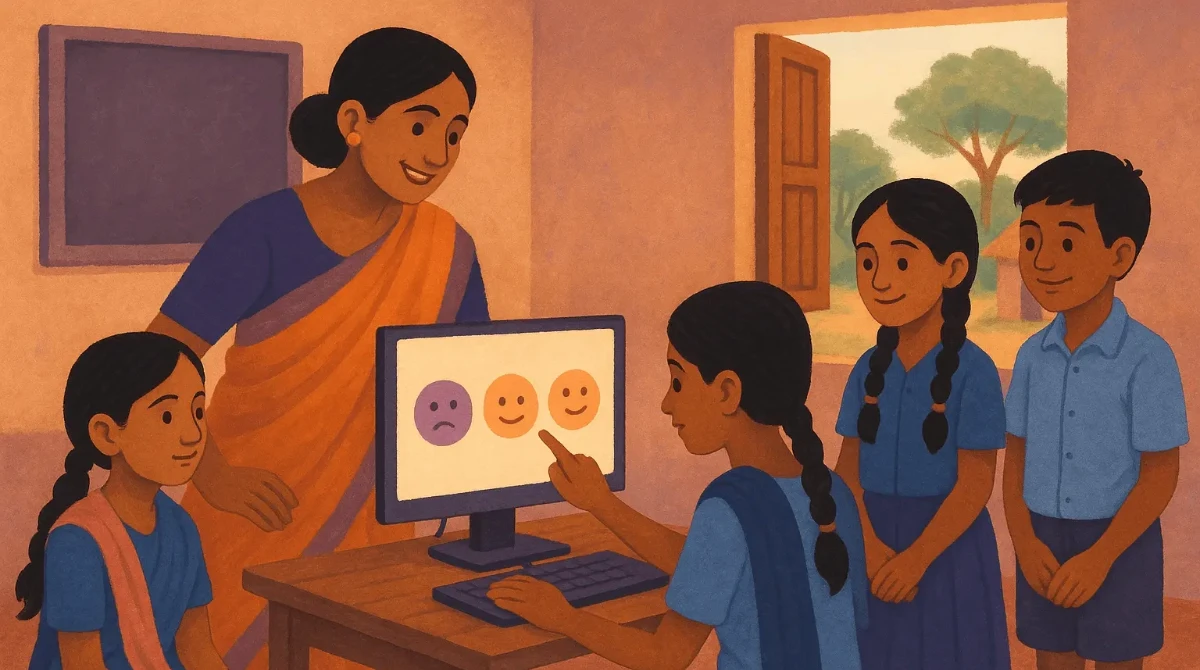
Designing for Constraints: How We Reimagined TrustCircle's Platform for Remote Tribal Schools in India
When we began working with Piramal Foundation and Piramal School of Leadership to bring the TrustCircle Well-being Platform to students in government schools across Jharkhand, Odisha, and Rajasthan, we knew the mission was meaningful.
Our goal was clear: empower students with a safe, digital space to reflect on their emotions, build emotional resilience, and develop healthy self-awareness.
As a platform built around emotional well-being and mental health, this was at the core of what we do.
What we didn't expect was how much we'd need to unlearn and reimagine to make that vision work—not just in theory, but on the ground.
The Reality Check: When Urban Tech Meets Rural India
Our platform, like many others, was originally designed assuming the basics of access:
- Every student has a device
- They can create or manage an email account
- They can log in and access the internet reliably
- Teachers or school staff can onboard students in bulk
But the reality on the ground in these states—especially in deeply remote and tribal regions—was very different.
- Most students don't own mobile phones, let alone have an email ID
- Internet access is patchy or nonexistent
- Many schools have just 1 or 2 computers shared by hundreds of students
- ICT lab coordinators often have limited time, tools, and support
Asking schools to create individual email accounts for each student—and manage passwords, mobile verification, or OTPs—was not just impractical. It was impossible.
And if the technology doesn't meet the user where they are, it simply doesn't work—no matter how well-intentioned it is.
The Pivot: From Account-Centric to Access-Centric Design
We had a choice to make. Either keep trying to make the original model fit—or go back to first principles and redesign for the real world.
So we asked a simple but powerful question:
What if we removed complexity entirely?
Here's what we did:
🔑 Unique Private IDs—No Emails, No Passwords
We replaced email logins with auto-generated, private student IDs. These IDs are known only to the student and their teacher. No account setup. No credentials to remember. Just a code to enter, reflect, and exit.
🧑🏫 School-Level Control—Empowering the Local
Instead of TrustCircle managing student data manually (which was tedious and error-prone), we built a simple admin panel for ICT Lab Coordinators. They can create and manage student IDs at the school level, on their own schedule—just friendly, intuitive, and fast.
⏱️ Fast, Time-Boxed Sessions—Built for Shared Labs
Since students take turns on shared computers, we optimized the experience to auto-timeout after one minute. Once a student logs their emotion, the system resets—ready for the next user. No logouts, no friction.
A Quiet Innovation with Powerful Reach
This new model might sound simple—and it is.
But its implications are profound.
By removing the assumptions of digital privilege, we created a system that is:
- Scalable—One that can be deployed across thousands of schools without bottlenecks
- Inclusive—Designed for students who are digitally invisible in most other systems
- Empowering—Giving agency to schools and coordinators without overburdening them
- Low-tech friendly—Requiring only the minimum infrastructure to operate
And for the first time, students in the remotest tribal belts of India—who may have never used an app or created an email—now have a way to regularly express their emotions, reflect on their mental well-being, and be part of a structured, supportive process.
This isn't just an iteration of our platform.
It's a shift in mindset—from "users must adapt to tech" to "tech must adapt to users."
The Road Ahead: Scaling with Empathy
The solution we built with Piramal Foundation is now proving to be replicable and robust across different geographies. But more importantly, it opens up a blueprint for how digital public goods can be made truly accessible.
If we want to bring well-being, education, and digital empowerment to India's 250+ million school-aged children—especially in tribal and underserved communities—we must design with empathy, constraints, and realities in mind.
At TrustCircle, this journey has reminded us that innovation doesn't always mean adding more.
Sometimes, it's about removing the barriers that prevent people from starting in the first place.
We're proud of where this is headed—and we're more committed than ever to building technology that's grounded, thoughtful, and truly inclusive.
If you're working in edtech, social impact, or public health and face similar challenges—we'd love to connect, collaborate, and learn from each other.
Let's build for Bharat, together.
#AIForGood #TechForGood #DigitalInclusion #TrustCircle #PiramalFoundation #SocialInnovation #DesignThinking #CTOStories #India #EdTech #MentalHealth #TribalSchools #PublicTech